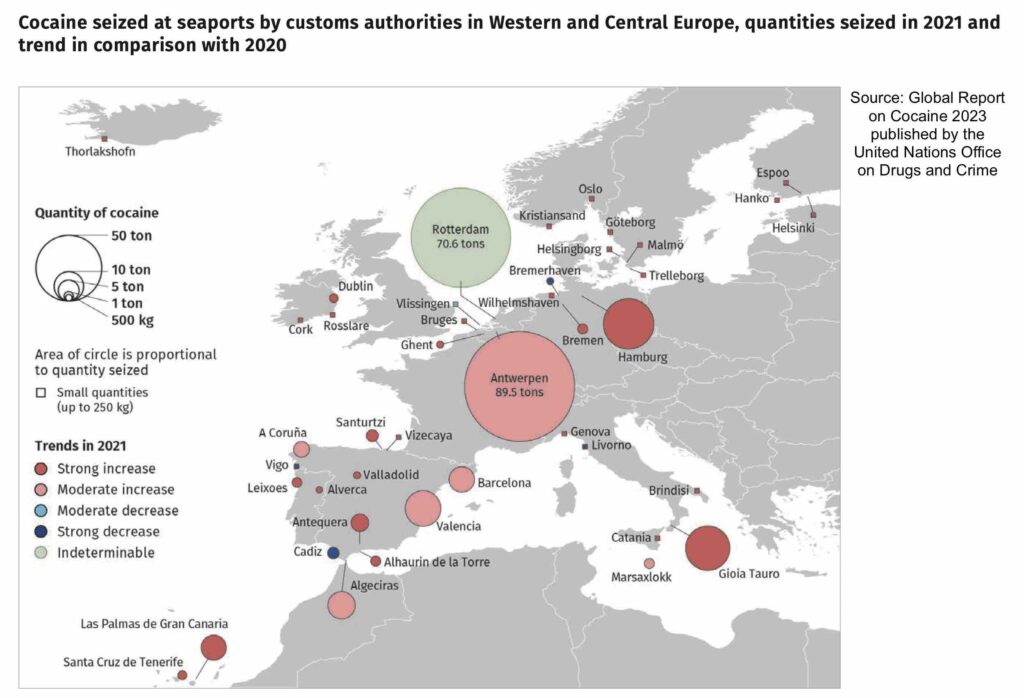You are here
European Ports Alliance formed to fight vast quantities of drugs arriving by ship
European Ports Alliance formed to fight vast quantities of drugs arriving by ship
Sam Chambers October 20, 2023 https://splash247.com/european-ports-alliance-formed-to-fight-vast-quant...
With drugs flowing through the continent’s ports in vast quantities, the European Commission has decided to create the European Ports Alliance bringing together all relevant public and private actors in the fight against drugs smuggling and criminal infiltration of logistics hubs. It mobilises member states, local authorities, law enforcement authorities including customs, EU agencies, and private actors operating in the ports with the aim of strengthening risk management and implementing more targeted and effective controls in ports including through funding state-of-the-art equipment that can help customs authorities scan containers and other means of transport and strengthening law enforcement operations in ports.
“Europe has now replaced the US as the single largest cocaine market in the world and is fast becoming a world hub for drug trafficking – a disturbing claim to fame and one we have to redouble efforts to reverse,” said Margaritis Schinas, vice president for Promoting our European Way of Life. “Today we are announcing a new series of measures to enhance the resilience of logistical hubs and dismantle criminal networks. This will be complemented by strong engagement with partners worldwide to crack down on the main supply routes.”
More than $220m will be spent on adding scanning equipment at ports. At Antwerp, the drug cartels’ favoured European port, authorities have vowed to get all high-risk containers scanned by 2028.
In April, Europol, the law enforcement agency of the European Union, launched a joint analysis report with the Security Steering Committee of the ports of Antwerp, Hamburg, Bremerhaven and Rotterdam looking into the risk and challenges for law enforcement posed by criminal networks in EU ports.
Criminal networks are increasingly working toward the infiltration of and control over major logistical points with the Europol report noting the use of misappropriated container reference codes gaining traction as a modus operandi for extracting illicit goods from ports.
Criminal networks arrange the infiltration of ports by coordinating local networks of corrupted port insiders, Europol detailed.
The main way criminals do this is through the corruption of shipping companies’ personnel, port workers, importers, transport companies, and representatives of national authorities among other actors, whose actions are necessary to secure the entry of illegal shipments. However, this approach requires corruption of a large number of accomplices.
In order to focus their efforts and minimise the risks of losing merchandise, organised criminals are seeking new modus operandi that require the corruption of far fewer individuals. Europol’s analysis report on criminal networks in EU ports looked into one specific technique, which exploits misappropriated container reference codes. This requires the corruption of just one individual, along with either the corruption or a Trojan horse-style infiltration of extraction teams, who are then paid between 7 and 15% of the value of the illegal shipment.
“If not addressed in an effective and efficient manner, the use of misappropriated container reference codes – and similar innovative modus operandi derived from it – is likely to increase,” Europol stated in a release, adding: “Criminal networks will continue to use major ports for trafficking and infiltrate them through corruption, as long as loopholes in the logistics chain and security procedures allow.”
As a side effect of the criminal operations in ports and the rivalry it entails, violence often spills out of major transportation hubs onto the streets of surrounding cities, where competition for distribution takes place.
Europol’s executive director Catherine De Bolle urged for greater collaboration between the public and private sector to fight against organised crime across the continent’s ports.
Ylva Johansson, European commissioner for home affairs, said: “The Europol report on criminal networks in ports illustrates what we are up against. It lays bare the sophistication of criminal drug gangs, their strength, and their savagery. The drug traffickers promote corrupt actions and practices sometimes by bribery, sometimes by intimidation.”
According to the International Chamber of Shipping, nearly 90% of all cocaine, 45% of all cannabis, and 30% of all amphetamine-type stimulants are trafficked by sea.

